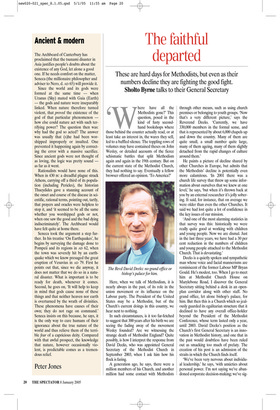Ancient & modern
The Archbeard of Canterbury has proclaimed that the tsunami disaster in Asia justifies people’s doubts about the existence of any God, let alone a good one. If he needs comfort on the matter, Seneca (the millionaire philosopher and adviser to Nero, d. AD 65) will provide it. Since the world and its gods were formed at the same time — when Uranus (Sky) mated with Gaia (Earth) — the gods and nature were inseparably linked. When nature therefore turned violent, that proved the existence of the god of that particular phenomenon how else could nature act with such ter rifying power? The question then was: why had the god so acted? The answer was usually that (s)he had been wor shipped improperly or insulted. One prevented it happening again by correcting the error with a massive sacrifice.
Since ancient gods were not thought of as loving, the logic was pretty sound as far as it went.
Rationalists would have none of this. When in 430 BC a dreadful plague struck Athens, carrying off a third of its popula tion (including Pericles), the historian Thucydides gave a stunning account of the onset and course of the disease in sci entific, rational terms, pointing out, tartly, that prayers and oracles were helpless to stop it, and ‘it seemed to be all the same whether you worshipped gods or not, when one saw the good and the bad dying indiscriminately’. The Archbeard would have felt quite at home there.
Seneca took the argument a step further. In his treatise ‘On Earthquakes’, he begins by surveying the damage done to Pompeii and its regions in AD 62, when the town was severely hit by an earth quake which we know presaged the great eruption of Vesuvius in AD 79. First he points out that, since we die anyway, it does not matter that we do so in a natu ral disaster. What is important is to be ready for death, whenever it comes.
Second, he goes on, ‘It will help to keep in mind that gods cause none of these things and that neither heaven nor earth is overturned by the wrath of divinities.
These phenomena have causes of their own; they do not rage on command.’ Seneca insists on this because, he says, it is the only way to cure humans of their ignorance about the true nature of the world and thus relieve them of the terri ble fear of a capricious deity. Compared with that awful prospect, the knowledge that nature, however occasionally violent, is predictable comes as a tremendous relief.
Peter Jones










































 Previous page
Previous page